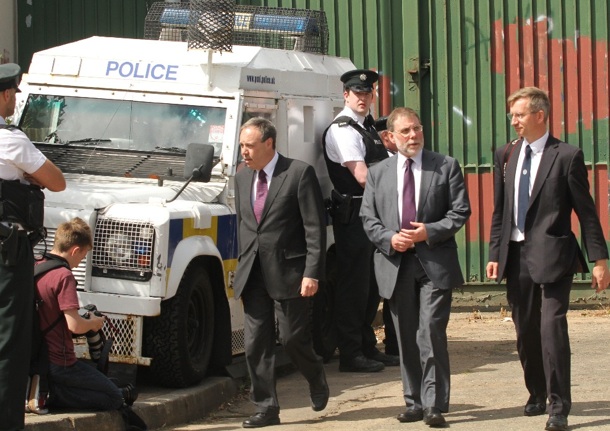9 July 2014
Unionism’s ‘graduated response’ more about opposition to power-sharing than parade ruling

DUP leaders Nigel Dodds and Nelson McCausland (centre) – not parading real issues
THE NATURE of political unionism and Orangeism’s “graduated response” to the Ardoyne parade determination will be tactically short-sighted – albeit involving tactics which may have repercussions for the political situation and potentially events on the ground.
The position adopted to date – including the stage-managed walk-out from all-party leaders’ talks; asserting that the institutions are under threat; the manufactured avoidance of the North-South Ministerial Council; combined with the Orange declaration that governance in the north will be impacted – throws up real strategic questions for unionism and what it expects to achieve.
Whenever pan-unionism has mobilised around rejectionist goals, the most extremist elements have always set the agenda and political instability, unrest and violence occur.
That’s exactly what happened during the unionist strikes in 1974/77, against the Anglo-Irish Agreement in 1985, during the Drumcree crisis in 1996/97, throughout the last two years, and specifically arising from the Orange-organised protest at Twaddell last July.
Unless proper leadership is provided within political unionism and the extremists within the Orange Order are shunned, this society can have no confidence that anything different will happen this time.
Political unionism is not committed to power-sharing and partnership government and is opposed to managing the ongoing process of change in the North.
Blaming the Parades Commission for putting the political institutions under threat is a smokescreen for a significant crisis of leadership within political unionism.
In turn, the default position for the unionist parties and paramilitaries becomes a retreat into another (temporary) pan-unionist front and the formation of an explicit anti-Agreement axis.
Contested parades are a vexed issue and must be resolved. Political unionism’s “graduated response” is a sham. It has nothing to do with unresolved parades and everything to do with opposition to the Good Friday Agreement framework and principles, power-sharing, and partnership government.
However, for political unionism to move away from that template will be like setting off on a journey into the wilderness without the satellite navigation switched on. The Good Friday Agreement (and other Agreements) and existing power-sharing arrangements are the only show in town.
A pro-Agreement axis is required.
The Irish and British governments, supported by the US administration, must now take the lead.
There is only one direction for the political process and that’s forward – towards a new phase of the Peace Process.
Political unionism should accept that reality and get back to the talks table.
Much better ‘Plan A’ – so let’s make it work properly.
Follow us on Facebook
An Phoblacht on Twitter
Uncomfortable Conversations

An initiative for dialogue
for reconciliation
— — — — — — —
Contributions from key figures in the churches, academia and wider civic society as well as senior republican figures





